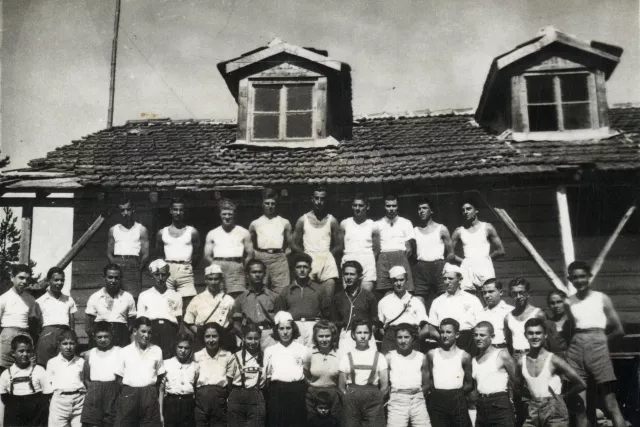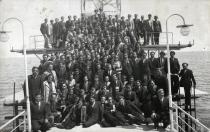This is a photo of the Maccabi summer camp built in August 1939 in the village of Boykovo. In the middle you can see the organizers of the trip. I’m the sixth from the right in the second row. I was in charge of the cultural activities. Next to me, the seventh from the left is Henrih Kohen, the head of the campsite, and the eighth from the left is Passy who was in charge of physical training.
The Jewish school was a four-year one. After that I attended a Bulgarian three-year junior high school and a Bulgarian five-year high school. In high school the Jews were free not to attend religion lessons. Our rabbi in Haskovo launched a course called 'Shar Hatorah' - Gate of the Torah, where we studied texts from the Bible, and I still remember almost the entire text of the first book in the Bible, which I had then learnt by heart. However, I was curious and used to attend the lectures in Christian religion. I learned by heart all their prayers only from hearing them. Once just before Easter, the teacher wanted to examine one of my classmates in prayers and he, alas, didn't know them. I whispered it to him, but the teacher heard me. She made me stand up and say not only this prayer, but some others, too. Then she scolded him for not knowing the prayers, as he was a Christian, and I, who was a Jew, knew them perfectly. Christian pupils were on special duties to attend the religious services in the churches on Sundays, and I didn't have to go. But I always went with the others. I didn't want to differ from them.
Zionist ideas were spreading in Haskovo then. I was a member of one of the Zionist organizations, Maccabi, until I became a university student. Other organizations were Betar, our opponents, and Hashomer Hatzair with which we were on friendly terms. There were organizations of the General Zionists in the town, as well as of the Revisionists, and Betar was the youth revisionist organization. They had one common goal: to set up Israel. General Zionists tolerated Maccabi, which wasn't very connected with political parties. On high Jewish holidays we greeted each other with the phrase 'Next year in Jerusalem.' We wanted to incorporate our language in the Jewish organizations: we used to sing songs in Ivrit, danced Jewish dances, spoke Ivrit as much as we could.





















